Monad transformers
Motivation
Programs often perform several side-effects
- Error reporting
- Stateful computations
- I/O
So, you can imagine a super-monad that does all of that
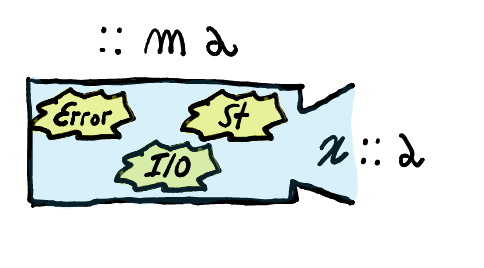
What happens if I need a monad with less effects?
- Redefine that definition for
m a, adaptreturnand(>>=)as well as the non-proper morphisms.
- Redefine that definition for
What happens if I need a monad with more effects?
- Redefine that definition for
m a, adaptreturnand(>>=)as well as the non-proper morphisms.
- Redefine that definition for
We want to compose effects in a modular manner.

We would like non-proper morphisms,
return, and(>>=)require minimum modifications when effects are added/removed.Monad transformers help us to do that.
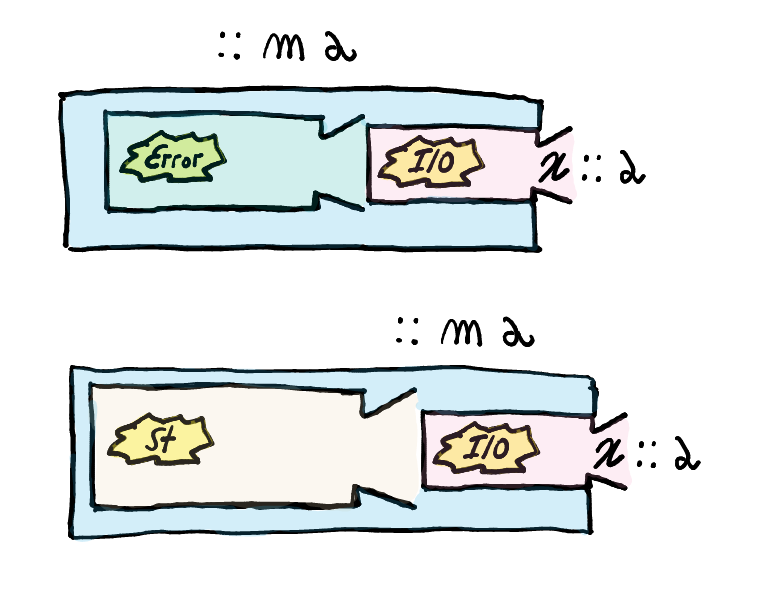 It allows us to combine effects on demand!Not all the possible combinations of effects can be modularly combined!
It allows us to combine effects on demand!Not all the possible combinations of effects can be modularly combined!Monad transformers are not the perfect solution, but they certainly helps (we will discuss more of the consequences of combining effects in the next lecture).
Running example: a simple interpreter
During this lecture, we consider a simple monadic interpreter.
The interpreter underlying monad is going to be modularly enhanced with different effects.
A simple (non-monadic) interpreter of expressions:
data Expr = Lit Integer | Expr :+: Expr s_eval :: Expr -> Integer s_eval (Lit n) = n s_eval (e1 :+: e2) = s_eval e1 + s_eval e2This code is not monadic, but we can change that.
Interpreter0: no side-effects
Any code can be "lifted" into the identity monad, i.e., a monad with no side-effects.
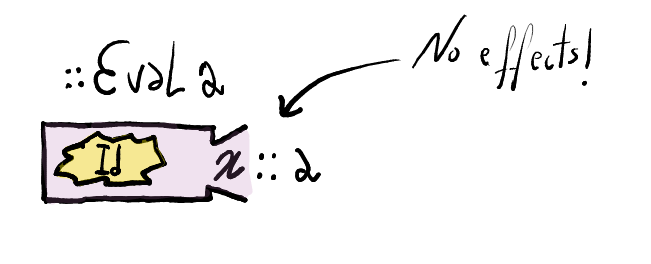
import Control.Monad.Identity type Eval a = Identity a
Type
Eval adenotes a monadic computation.We change the type of the interpreter to return a monadic computation
eval :: Expr -> Eval Integer eval (Lit n) = return n eval (a :+: b) = (+) <$> eval a <*> eval b
We leverage the function
runIdentity :: Identity a -> ato run the interpreter.runEval :: Eval a -> a runEval = runIdentity
There are no effects, it just computes the result. More formally, we have that
runEval . eval ≡ s_eval
We want to extend our interpreter with new features
- Local declarations
- Exceptions
- References
How are we going to extend the
Evalmonad?
Enter monad transformers
Monad transformers are type-level functions
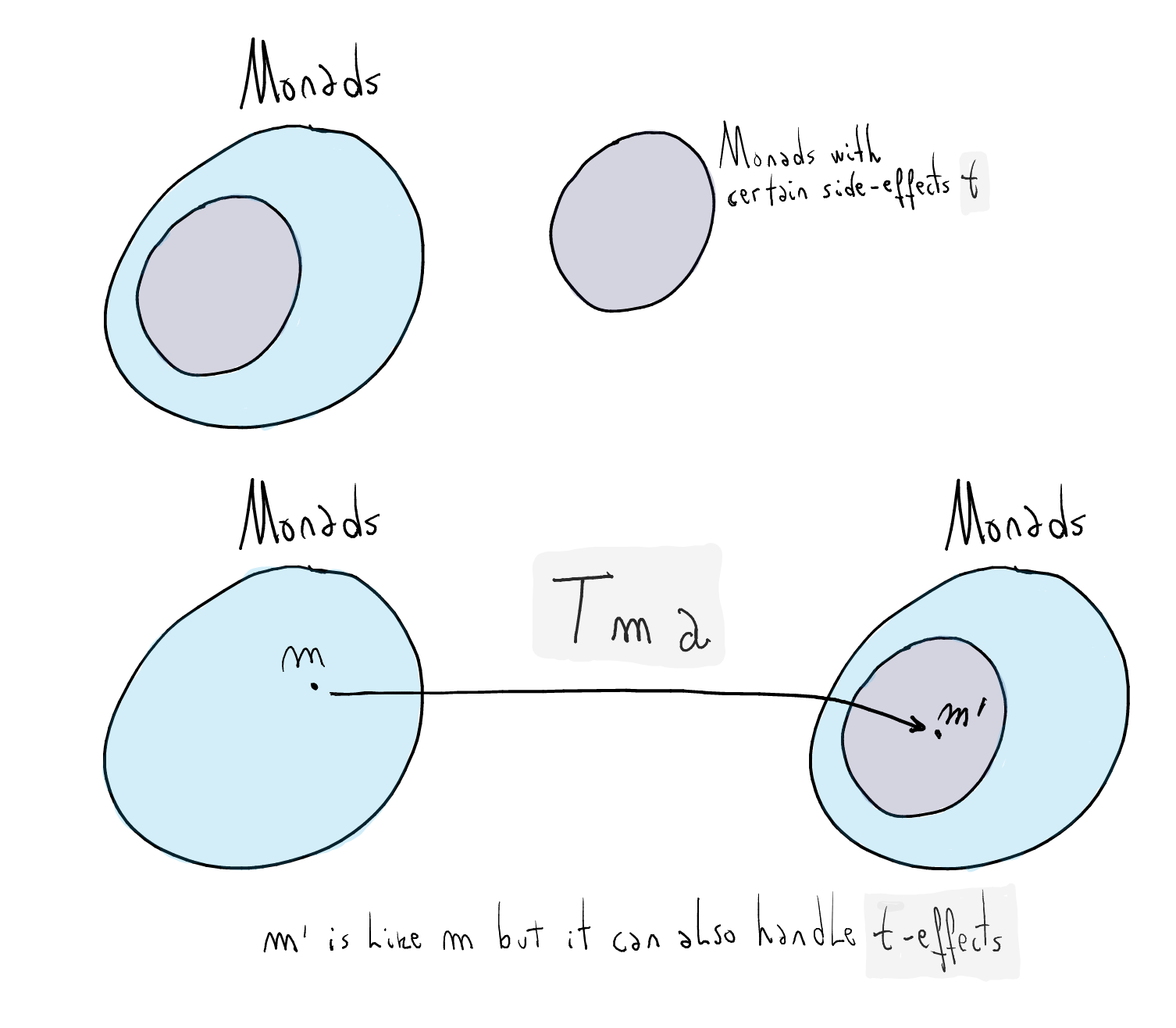
A certain monad transformer
Ttakes a monadmand produces a monad with additional side-effectsEvery monad transformer
Tmaps monads into a set of monads with the side-effects added byT
Interpreter1: the reader monad transformer
We want to extend our language of expression with local bindings, e.g., we would like to run a program like
let x = 5; x+x.We extend our data type for expressions:
data Expr = Lit Integer | Expr :+: Expr | Var Name -- new | Let Name Expr Expr -- newBindings are immutable, i.e., once a variable is bound to a value, it cannot be changed.
Expression can now involve bound variables, e.g.,
x+y.To evaluate expressions,
evalshould include an immutable environment which contains the values for bound variables.We model environments as mappings from variables names to values, i.e., think it a mapping as an element of type
[(Name, Value)]orName -> Maybe Value.We use mappings from the module
Data.Map:type Env = Map Name Value emptyEnv = Map.empty Map.lookup :: Ord k => k -> Map k a -> Maybe a Map.insert :: Ord k => k -> a -> Map k a -> Map k a
We would like to implement a monad with a read-only environment since bindings are immutable.
One alternative is to hard-wire it into the interpreter:
eval :: Env -> Expr -> Eval Value
This means that there would be some plumbing to pass the environment between recursive calls (recall lecture 3).
Instead, we use the monad transformer
ReaderTto add a read-only state into theEvalmonad!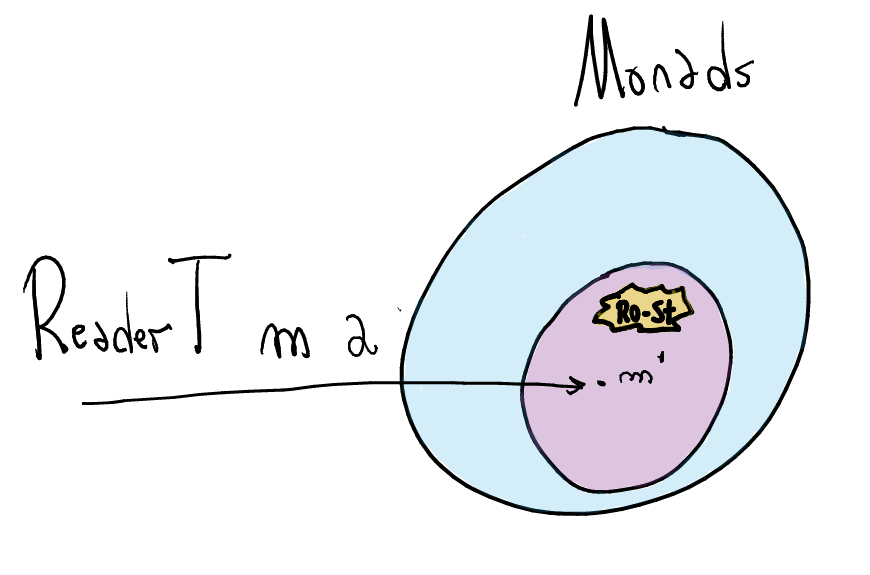
In other words,
ReaderTtakes a monadmand returns a monad which support two operations:localandask— such monads are calledMonadReader.A monad obtained by the transformer `ReaderT` is a `MonadReader`, but not all `MonadReader`s are obtained by using the monad transformer `ReaderT`!type ReaderT r m a runReaderT :: ReaderT r m a -> (r -> m a) class Monad m => MonadReader r m where ask :: m r local :: (r -> r) -> m a -> m a instance Monad m => Monad (ReaderT r m) instance Monad m => MonadReader r (ReaderT r m)
Implementation:
newtype ReaderT r m a = ReaderT { runReaderT :: r -> m a }The monad
Evalis then responsible for the plumbing required to pass around the environment.{-# LANGUAGE GeneralisedNewtypeDeriving #-} newtype Eval a = Eval { unEval :: ReaderT Env (Identity) a } deriving (Functor, Applicative, Monad, MonadReader Env)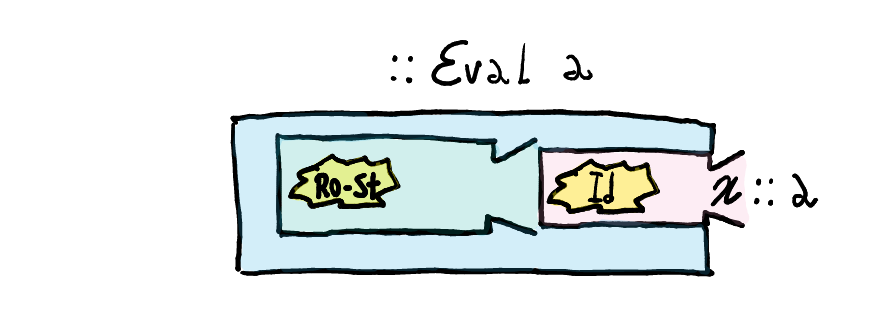
We introduce a new data type, rather than just a type synonym, because we want Haskell to derive some type-classes instances.
Due to instance
MonadReader Env Eval, our evaluation monad supportsask :: Eval Env local :: (Env -> Env) -> Eval a -> Eval a
Let us define some environment manipulation based on
localandask.Looking up the value of a variable in the enviroment.
lookupVar :: Name -> Eval Value lookupVar x = do env <- ask case Map.lookup x env of Nothing -> error $ unwords ["Variable", x, "not found."] Just v -> return vWe can extend the environment with a new binding for a local computation. Since we are using a reader monad, we can be sure that this binding does not escape outside its intended scope.
localScope :: Name -> Value -> Eval a -> Eval a localScope x v m = local (Map.insert x v) m
The interpreter is extended by simply adding cases for the two new constructs. (None of the old cases has to be changed.)
eval :: Expr -> Eval Value ... eval (Var n) = lookupVar n -- here, we use ask eval (Let n e1 e2) = do v <- eval e1 localScope n v (eval e2) -- here, we use local
The
runfunction simply runs the interpreter with the initial empty environment.runEval :: Eval a -> a runEval m = runIdentity (runReaderT (unEval m) emptyEnv)
Observe how we run the reader monad first, and then the identity monad.
When using monad transformers, you start running the outermost monad and finish with the innermost one of your monad stack.

The textual ordering of runners in
runEvalis reversed w.r.t. the ordering of type constructors innewtype Eval. We can get the same textual order with reverse application(&) : a -> (a -> b) -> band infix sections:newtype Eval a = Eval ( ReaderT Env Identity a) runEval m = m & unEval & (`runReaderT` emptyEnv) & runIdentity
Example
runEval $ eval (parse "let x=1+2; x+x") > 6
Implementation of
ReaderT:newtype ReaderT r m a = ReaderT { runReaderT :: r -> m a } instance Monad m => MonadReader r (ReaderT r m) where ask :: ReaderT r m r ask = ReaderT \ r -> return r local :: (r -> r) -> ReaderT m a -> ReaderT m a local f m = ReaderT \ r -> runReaderT m (f r) instance Monad m => Monad (ReaderT r m) where return :: a -> ReaderT r m a return a = ReaderT \ r -> return a (>>=) :: ReaderT r m a -> (a -> ReaderT r m b) -> ReaderT r m b m >>= k = ReaderT \ r -> do a <- runReaderT m r b <- runReaderT (k a) r return b
Exercise:
- Do we have
Applicative m => Applicative (ReaderT r m)? - Can you implement the interpreter with just the
Applicativeinterface (noMonad)?
Interpreter 2: the state monad transformer
We want to extend our language of expression with mutable references, e.g., we would like to run a program like
let r = new 7; !r+!rWe add new constructors in our expressions language for creation, reading, and writing of references.
data Expr = Lit Integer | Expr :+: Expr | Var Name | Let Name Expr Expr | NewRef Expr -- new | Deref Expr -- new | Expr := Expr -- newExpression
NewRef ecreates a fresh reference which initially contains the value denoted bye.Expression
Deref edenotes the value stored by the reference denoted bye.Expression
e1 := e2changes the value stored in the reference denoted bye1with the value denoted bye2.The interpreter needs a notion of memory or store to keep the values stored in references.
This store is mutable, since references are mutable too!
We represent it as a mapping from memory locations to values:
type Ptr = Integer data Store = Store { nextPtr :: Ptr , heap :: Map Ptr Value }A
Storeis then a mapping from a value denoting a memory location to the value stored at that location.For instance, the following mapping
Map.insert 2 42 (Map.insert 1 7 (Map.insert 0 101 Map.empty))
denotes a memory with three references: at location
0with value101, at location1with value7, and at location2with value42.We also remember the next unused pointer as part of the store (useful when allocating a new reference).
emptyStore :: Store emptyStore = Store 0 Map.empty
As before, one alternative is to hard-wire it into the interpreter
eval :: Store -> Expr -> Eval Value
This means that there would be some plumbing to pass the store (memory) between recursive calls (recall lecture 3).
Instead, we use the monad transformer
StateTto add a mutable state into theEvalmonad!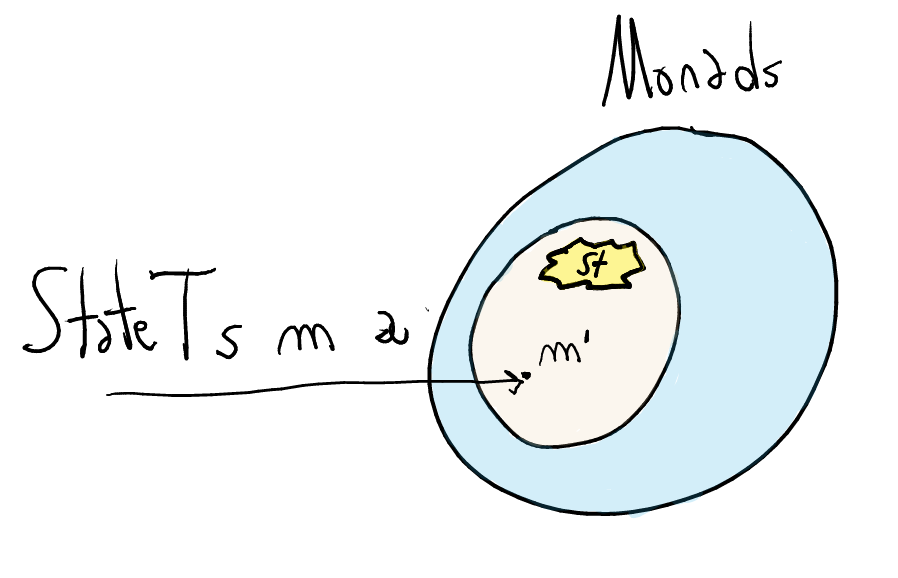
In other words,
StateTtakes a monadmand returns a monad which contains a mutable state of certain typesand two operations:getandput— such monads are calledMonadState s. (Actually, they have one more operation (state) but we will not describe it here)data StateT s m a evalStateT :: Monad m => StateT s m a -> s -> m a class Monad m => MonadState s m where get :: m s put :: s -> m ()
The monad
Evalis then responsible for the plumbing required to pass around the store.newtype Eval a = Eval { unEval :: StateT Store (ReaderT Env Identity) a } deriving (Functor, Applicative, Monad, MonadState Store, MonadReader Env)
Alternatively, we could have defined an state-reader monad from scratch, i.e., not using the monad transformers
newtype Eval a = Eval { unEval :: Store -> Env -> (a, Store) }**Exercise**: Implement a "state-reader monad" directlynewtype MyMonad s e a = MyMonad {runMyMonad :: s -> e -> (a,s)}instance Monad (MyMonad s e) where return = returnMyMonad (>>=) = bindMyMonad
returnMyMonad :: a -> MyMonad s e a returnMyMonad x = MyMonad \ s -> \ e -> (x, s)
While it works, the price to pay is modularity.
Let us define some operations for the interpreter based on
getandput:Creation of a new reference: modify both the next available memory location and the heap.
newRef :: Value -> Eval Ptr newRef v = do store <- get let ptr = nextPtr store new_ptr = 1 + ptr newHeap = Map.insert ptr v (heap store) put Store{ nextPtr = new_ptr, heap = newHeap } return ptrGetting the value of a reference: look up a memory location in the store. We crash with our own "segfault" if given a non-existing pointer (observe that the state has not been changed.)
deref :: Ptr -> Eval Value deref p = do st <- get let h = heap st case Map.lookup p h of Nothing -> error $ unwords ["'Segmentation fault':", show p, "is not bound."] Just v -> return vUpdating a reference: change a value in the store.
(=:) :: MonadState Store m => Ptr -> Value -> m Value p =: v = do store <- get let updt_heap = Map.adjust (const v) p (heap store) put store{ heap = updt_heap } return v -- Map.adjust :: (Ord k) => (a -> a) -> k -> Map k a -> Map k aObserve that
(=:)has no effect if the reference does not exist.**Exercise**: Maybe that is not the best semantics. What would it be a better one?We define the evaluation of expressions for the new cases with the functions described above.
eval :: Expr -> Eval Value ... eval (NewRef e) = do v <- eval e newRef v eval (Deref e) = do p <- eval e deref p eval (pe := ve) = do p <- eval pe v <- eval ve p =: v
As before, we do not need to change the definition for the old constructors.
We can test it:
> runEval $ eval $ parse "let p=new 7; !p" 7
Unfortunately, our expression language supports pointer arithmetic (like C), so a pointer might dereference another one — a recipe for disaster!
> runEval $ eval $ parse "let p=new 1; let q=new 1738; !(p+1)" 1738
How are we going to fix it?
(Discuss solutions.)
What else can go wrong with our interpreter?
Expressions might refer to unbound variables / references.
> runEval $ eval $ parse "q + 1" *** Exception: Variable q not found.
> runEval $ eval $ parse "!q" *** Exception: Variable q not found.
We need some exception handling mechanism into the language of expressions.
Summary
Programs often handle more than one effect
Monad transformer are type-level functions which allow one to extend existing monads with additional side-effects
The deriving mechanisms in Haskell is quite powerful and promote re-utilization of code
Monad transformers are not essential and you can create your own monad with all the effects that you need. The problem? Modularity, i.e., code rewritten if you need to change your monad to add a new effect.